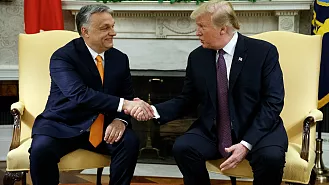Could Europe’s Far-Right Capitalize on Donald Trump’s Victory?


Donald Trump’s recent electoral victory has sent ripples across the global political landscape, raising questions about its potential impact on Europe’s far-right movements. As Trump continues to wield significant influence within the United States, European far-right parties and leaders are closely monitoring his strategies and rhetoric, contemplating whether they can harness his success to bolster their own agendas.
Trump’s Influence on Far-Right Ideologies
Donald Trump’s presidency was marked by a nationalist and populist approach, emphasizing immigration control, economic protectionism, and skepticism towards multinational alliances. These themes resonate strongly with many far-right groups in Europe, who advocate for similar policies. Political analyst Dr. Elena Rossi from the University of Amsterdam notes, “Trump has effectively galvanized a segment of the American electorate that feels disenfranchised by globalization and cultural changes. European far-right parties are keen to replicate this model to mobilize their own base.”
Strategic Adaptations by European Far-Right
European far-right parties, such as France’s National Rally, Italy’s League, and Germany’s Alternative for Germany (AfD), have been increasingly adept at using social media and direct communication to bypass traditional media channels, much like Trump did. These parties are studying Trump’s campaign tactics, including his use of charismatic leadership and provocative statements to maintain media attention and voter engagement.
Potential Benefits and Risks
A Trump victory could provide a symbolic boost to Europe’s far-right, reinforcing their narratives about national sovereignty and anti-immigration. It may also inspire greater collaboration among these parties across different countries, fostering a more unified front against perceived liberal and globalist threats. However, there are significant risks. Increased polarization and the potential for heightened xenophobia could lead to social unrest and backlash from more moderate segments of society.
Expert Perspectives
Political scientist Dr. Marcus Lindström from Stockholm University emphasizes the nuanced impact: “While Trump’s success can energize far-right movements, European contexts are different in terms of political structures and societal norms. The far-right must adapt Trump’s strategies to fit their unique environments, which could either lead to a new wave of populism or result in fragmentation if their messages don’t resonate as strongly.”
Broader Implications for European Politics
The alignment or divergence from Trump’s ideologies will play a crucial role in shaping the future political discourse in Europe. Governments and civil society organizations are also responding by reinforcing commitments to democratic values and countering extremist narratives. The European Union’s stance on issues like immigration and economic policy will be pivotal in either mitigating or exacerbating the influence of far-right movements inspired by Trump’s victory.
Conclusion
Donald Trump’s electoral success presents both opportunities and challenges for Europe’s far-right. While his strategies and rhetoric offer a blueprint for mobilization, the distinct political and cultural landscapes in Europe will determine the extent to which these movements can effectively capitalize on his victory. As the global political environment continues to evolve, the interplay between American populism and European far-right dynamics will remain a critical area of focus for policymakers and analysts alike.
Recent Posts
Ether Surpasses 2021 Record Following Powell’s Rate Cut Hints
Ether's price surged past its 2021 record after Jerome Powell's speech hinted at potential rate…
Understanding the Federal Reserve’s Impact on Retirees’ Financial Security
Explore how the Federal Reserve's policies affect retirees and the broader economy, ensuring financial stability…
Federal Reserve Chair Candidate Interviews to Begin After Labor Day
Treasury Secretary Scott Bessent confirms interviews for Federal Reserve chair candidates will start post-Labor Day,…
Walmart and Competitors Reveal Earnings Amid Rising Tariff Impact
Walmart and rivals report earnings, highlighting tariff effects on consumer prices. Insights on market trends…
Financial Challenges Facing Seniors: Navigating a Tight Budget
Explore the financial struggles seniors face on limited incomes and discover strategies for effective budgeting…
U.S. Stock Futures Rise Ahead of Fed Meeting After Trump-Putin Summit
U.S. stock futures see slight gains following the Trump-Putin summit as investors prepare for the…